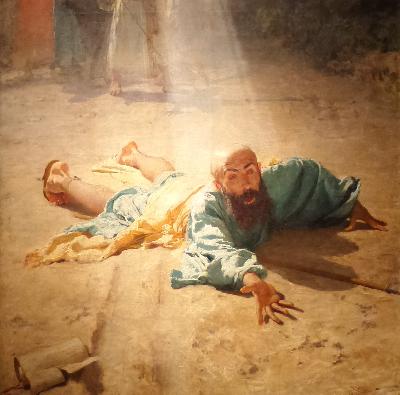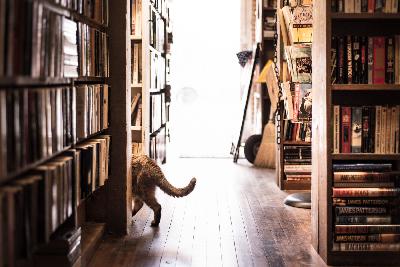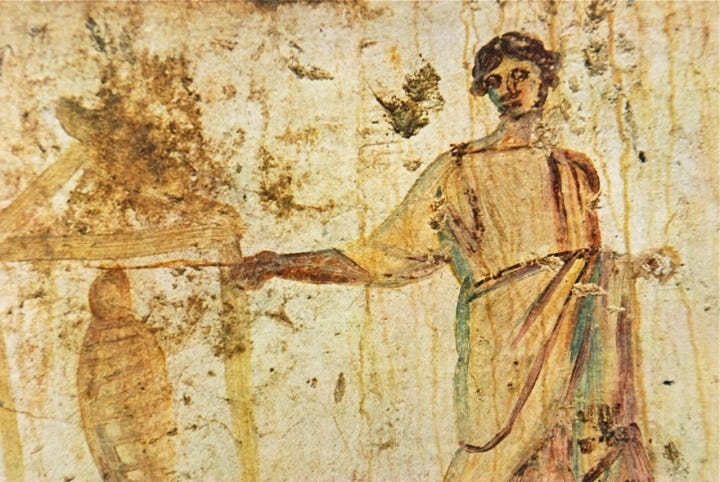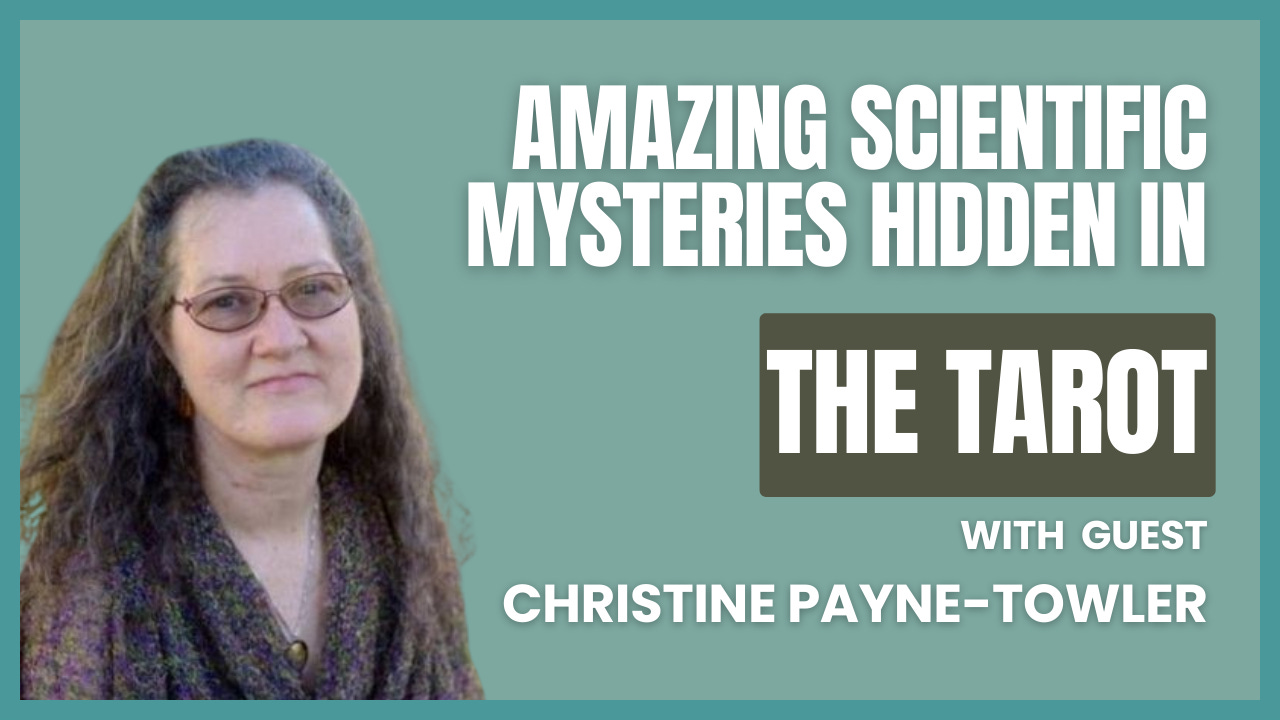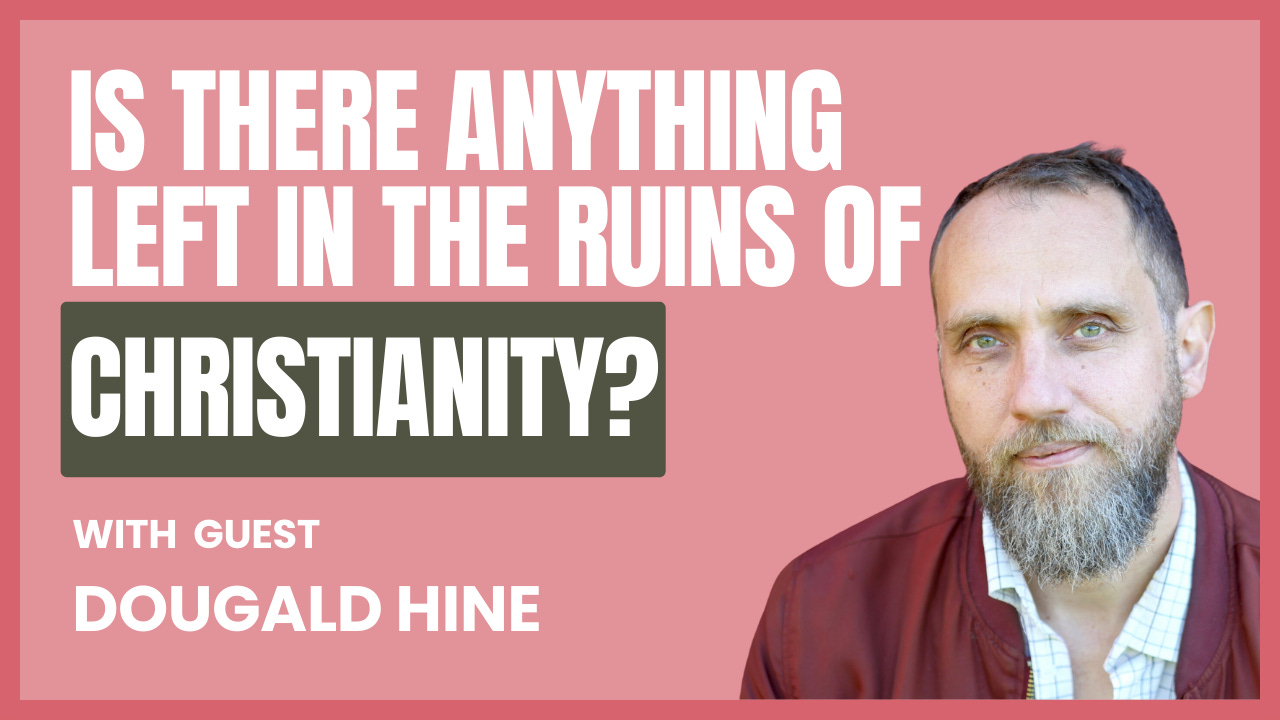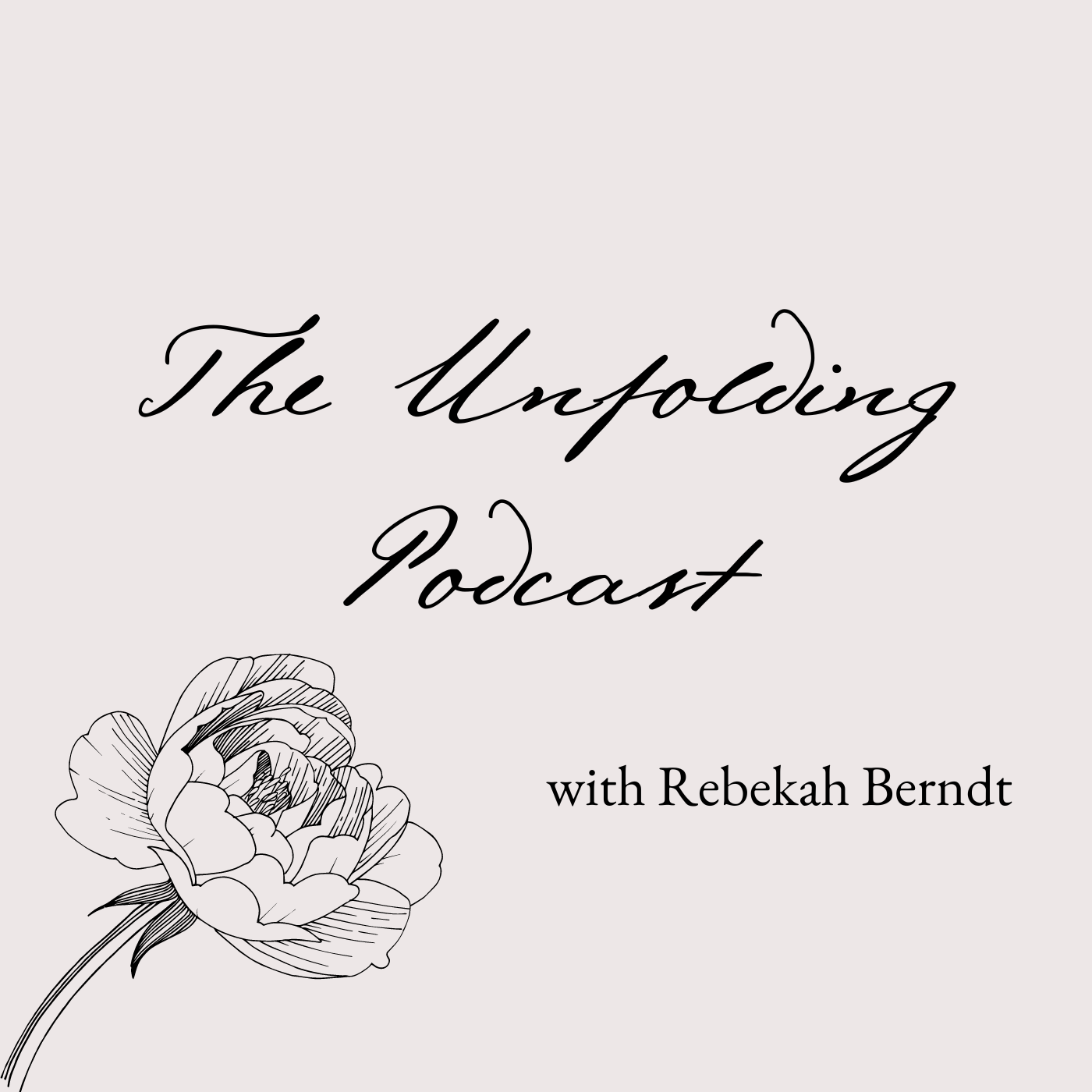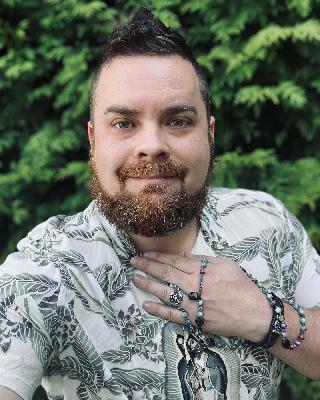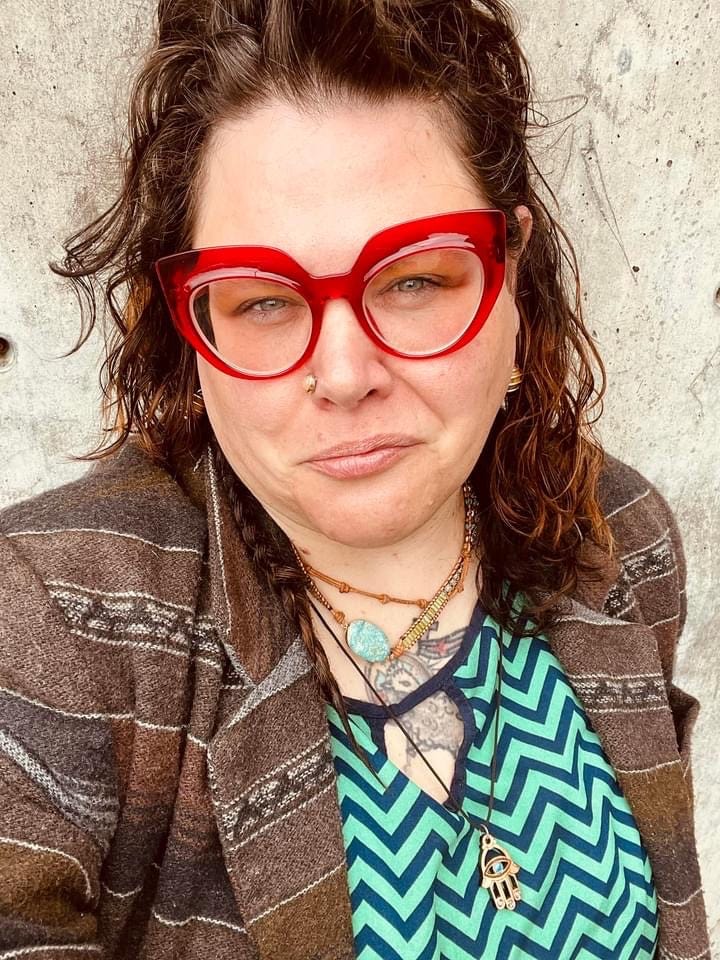Discover The Unfolding Podcast
The Unfolding Podcast

 The Unfolding Podcast
The Unfolding Podcast
Author: Rebekah Berndt
Subscribed: 2Played: 7Subscribe
Share
© Rebekah Berndt
Description
Join spiritual director and recovering activist Rebekah Berndt in seeking truth and wisdom as things come undone. We'll be exploring faith, spirituality, politics, and culture from from a place beyond ideology and dogma.
rebekahberndt.substack.com
rebekahberndt.substack.com
9 Episodes
Reverse
Was Paul visited by a UFO—or something like it? I explore previous theories and a new connection that (I believe) I have discovered in Part 1 of my series looking at Paul through a shamanic lens. Links and references are in the substack piece and you can check out my Spiritual Direction, Astrology, and other services at rebekahberndt.com This is a public episode. If you would like to discuss this with other subscribers or get access to bonus episodes, visit rebekahberndt.substack.com
There’s a certain kind of bookstore that is more than a bookstore. It’s a portal into a place beyond time and space, a great cathedral full of ancestors who have lived and loved and bled for human knowledge and the written word. This kind of bookstore will rarely have the latest bestsellers. The best exemplars of its kind are run by scraggly-haired old men who look as though, in another life, they were cagey pirates, sinister apothecaries, or pipe-smoking wizards. The shelves are packed close together and sky-high; sometimes there are stacks of books piled in front of books, blocking aisles and threatening to bury the hapless peruser in an avalanche of musty, yellowing leaves. A really top-notch bookshop will have a resident cat or two, sunning itself in a window, leaping haughtily out of reach when you attempt to pet her before returning to tease you twenty minutes later with a swish of silky fur against your legs.There will be a section for antique and rare books, as well as a selection of classic reprints from The Folio Society with sewn bindings and marbled endpapers. But the real magic is in the deep cuts—like long-forgotten favorites of twenty or even forty years ago or works of history written by eccentric midcentury scholars. The shelves may appear chaotic at first, but there is almost always a ruthless efficiency of organization by subject. How this is done is always a reflection of the personal quirks and interests of the owner, though concessions are made to local tastes and trends.My primary experience with bookshops as a child were chains encountered in my local mall. There were Waldenbooks and B.Dalton, indistinguishable from one another as far as I could tell, with their bland corporate facades and neat displays of whatever was tearing through the zeitgeist at the moment: Men Are From Mars, Women Are From Venus; The Celestine Prophecy; something by Tom Clancy or Patricia Cornwell. There was the Zondervan Family Bookstore, the place my mother preferred to shop because she could be assured that anything she purchased for me would be free of sex, drugs, and anything “weird.” (What my mother considered weird was always a moving target, but anything that smacked too much of the occult was a safe bet. Strangely, books about fighting demons were not “weird.”) Over the years, Zondervan grew to carry more than just books, opting to become a one stop shopping solution for all Christian gift-giving needs. Ceramic figurines depicting scenes from the Bible, scripture-wrapped Testamints that freshened your breath with the power of the Word, and, my personal favorite, an enormous crown of footlong thorns “just like the one Jesus wore” for all your Eastertide cosplaying needs.As I grew into my teens, these gave way to the large, free-standing behemoths: Borders and Barnes & Noble, with acres of spacious bookshelves, a section for CDs complete with listening stations where you could hear the latest releases, and Starbucks-style cafés, perfect for a late-night high school hang. I first understood what a bookstore was really for when, at the age of 18, I walked into Prospero’s Books in historic downtown Manassas, Va. It had everything—the cat, the old man, the rare books, the overloaded shelves, the higgledy-piggledy feeling of a curiosity shop in a fantasy novel. Being down the road from one of the most infamously bloody battlefields in American history, Prospero’s had a large selection on the Civil War as well as a deep shelf of inexpensive classics printed in the 60’s and 70’s. It was there I bought my first copy of T.S. Eliot’s Complete Poems as well as a few other odds and ends that were cheap enough (no more than a few bucks) for me to afford on the tips I earned waitressing.It goes without saying that this ideal bookstore is a used bookstore; not only does it make far more sense as a business model for the determined eccentric, who will never be able to compete with the big boys on the price of new books; it is the only kind of bookstore a true book lover can lose herself in. She delights in finding a volume appended with thoughtful handwritten notes, for now she can be in communion with those who have read before her and feel a kinship with the nameless someone who has underlined the same words that she loves. The ideal bookstore is almost always unfashionable, though there are a few outliers which have somehow managed to combine the business of being large and hip while still stocking the weird and the esoteric. The Last Bookstore in LA is an exemplar of this sort of thing. Housed in a cavernous old bank building downtown, the main floor is full of a mix of new and used books and vinyl—some of which are housed in the antique bank vaults—and cozy armchairs for reading. Upstairs, a gallery runs around the edges of the main room, filled with art—paintings and old books turned into sculpture and a crocheted spiderweb. A tunnel made of books leads to a back room filled with volumes on the more arcane and specialized subjects. It’s kind of a bookstore as postmodern art project, but it works. The owner is a relatively young man who happens to love books; I have no doubt he is well on his way to becoming a wonderfully weird old coot.The Unfolding is a reader-supported publication. To receive new posts and support my work, consider becoming a free or paid subscriber.Compare this to The Strand in Manhattan, which, in my opinion—and I know some people will find this scandalous—is not in the same league. Yes, it’s a very large, very comprehensive, and well-run bookstore, and I can usually find something I like there, but there’s a bit too much self-consciousness to the whole thing. I find that NYC bookstores in general are always a bit too smug for their own good. There’s an air of, “Look at us, aren’t we smart? We have all the right ideas and opinions; there’s nobody like us in the world.” Ditto for Powell’s in Portland. Don’t get me wrong, I continue to visit these places, and I’m glad they exist, but they lack a certain pleasurable frisson, a current of sorcerous power.The best bookstores will take you through the looking-glass and into the magical otherworld. I fancy myself something of a book witch. I have an ability to stumble upon just the book that will speak to whatever I am pondering at the moment, and others have told me that I have a gift for recommending the ideal book for their current needs. From the medieval lanes of Norwich to the gleaming streets of Palo Alto, I have more than once been pulled, as if caught on a hooked line, into a bookstore, certain that buried in the stacks is some gem wanting to reel me in.It was in that upper room of The Last Bookstore that I once went in search of a particular text. I didn’t know what the name of it was, what it looked like, or who wrote it. In fact, I had nothing particular in mind. I only knew that there was a book there for me and that I thought it would be found in the Tarot section.The pickings were slim, and I couldn’t see that any of them were worth buying, but the whisper in my ear was strong. There’s something here, it said. Keep searching. The clerk stocking the shelves asked me if there was anything I was looking for. I told him I wanted something on the Tarot, and he admitted they didn’t have much of a selection but proceeded to ask me about my interest, which led us into a conversation about mysticism and various esoteric philosophies. “Okay,” he finally said after some time. “I have a book I stashed away because I didn’t want it to go to just anybody. But I can tell you’re the kind of person who will appreciate it.” He disappeared behind the shelves and returned with a copy of Meditations on the Tarot. I was absolutely delighted.Sadly, these places don’t last forever. Prospero’s didn’t survive the pandemic, and another LA favorite, Sam Johnson’s Bookshop in Mar Vista, which I first discovered in 2013 while biking down Venice Boulevard to the beach, closed in 2019. They had a wonderful selection on religion and philosophy, including a fair amount on Christian mysticism. I found a pristine three-volume set, printed in the 80’s, of Meister Eckhart’s complete Sermons and Treatises. I paid about $30 at the time; if I were to buy it online today, it would cost that much for just one of the volumes. I am happy to say that Dove & Hudson in Albany, NY, with its excellent collection of books on medieval history, is still around, and Green Apple Books in San Francisco, despite some difficulties, remains.I realize that it is horribly sexist of me to suggest that only old men (or men old before their time) can create these kinds of bookstores, but it seems to be the general trend. It’s not that a woman can’t create a good bookshop. One of the best occult bookstores in the world is Treadwell’s in London, with a female proprietor. They have an excellently curated selection of new books and wonderful author events, but the feel of the place is a bit too prim and neat to qualify as truly magical. The problem with most women is that we can’t stand to present things to the public unless they are neat and tidy. My own bookshelves are overflowing with all sorts of odds and ends, but if I had my own store, I’d be hard-pressed not to make it look pretty. The thing about old men is that they don’t care about that sort of thing. They will allow a shop to become gloriously shambolic in the same way they allow their bellies to spill out over their waistbands and their socks to fall down around their ankles. It’s in the dusty, forgotten corners with precariously stacked books that the fairy-dust accumulates. But if anyone knows some fabulous old witch who’s not afraid to run a slightly seedy bookshop, I’m happy to be proven wrong.Thanks for reading The Unfolding! This post is public so feel free to share it.In addition to writing, I offer psychic aura readings. My clients tell me that these readings are “life-changing,” “very accurate,” and can help them make big decisions
“…there are rising trends in science suggesting that what was once called magic is poised to evolve into a new scientific discipline, just as medieval astrology and alchemy evolved into today’s astronomy and chemistry. The new discipline will be the study of the psychophysical nature of reality, that mysterious, interstitial space shimmering between mind and matter. Understanding how this enigmatic space works in a way that’s consistent with the rest of science requires a new worldview—the lens through which we understand reality.” ~ Dr. Dean RadinOver the past few months, I’ve been pondering the direction of this newsletter. What began as an exercise to push myself to write—something, anything—became an outlet for me to process my break-up with progressive activism and a reductive gospel of social justice. Recently, I’ve been challenged to clarify my vision for what I want to do here and set some goals. When I dug down deep and asked myself, “what do I really want to write about? What do I want to devote the most significant portion of my passion and energy to accomplishing?” the answer came back loud and clear: through writing and storytelling, I want to teach people about Christian magic. I sighed in frustration when I heard this answer. A few of my friends and a fair number of my readers will laugh when they read this, because if you know me or have read this newsletter at all, you will know that I talk about these two subjects with some frequency. I’ve written about the thin line between mysticism and magic, and the magical aspects of the Eucharist, among other things. Yet there’s something about putting those two words together in a mission statement that strikes me as hopelessly cheesy, like evangelicals who blatantly rip off popular books and movies while adding a salvation message. WitchTok and other manifestations of the occult trend show no signs of abating, and my head says that baldly presenting myself this way will come across as a desperate grab for relevance. But when I speak it out loud, I feel a deep-down sense of rightness and satisfaction. Yes, I say. Of course that’s what I want to write about. I love these two things, and I believe they are helpful and true and using them together is necessary for the moment we’re in. Christians, even the progressive ones, tend to get anxious and uneasy at any whiff of the magical arts, and occult practitioners are likewise suspicious of Christians. But I know that both these streams of spirituality have enriched my life, that one has enhanced my appreciation of the other, and that together they have helped me to better understand the nature of reality.1. What is Magic?What we call the material world is only a small piece of what exists. We know, for example, that there are frequencies of sound we cannot hear and wavelengths of light we cannot perceive. We know this because we’ve developed instruments to detect and measure them, but it doesn’t take any great leap of imagination to intuit that there are likely realities beyond our capacities for measurement that we remain blind to. Scientists are increasingly suspecting that the universe itself is conscious and that what we understand as matter may be a product of that consciousness. Dr. Bernardo Kastrup, who has PhDs in both philosophy of mind and computer engineering, likens our experience of the world to a pilot flying a plane in the dark. The pilot cannot see anything through his window, but the screens and dials on his dashboard tell him how high the plane is flying, what direction he’s going in, how strongly the wind is blowing, and whether there is anything in his path. These instruments are not actually the wind, the pressure of the atmosphere, the forces of gravity, or other objects in space. But they have a fixed and reliable relationship with those things that enable him to safely fly the plane to its destination. In the same way, our senses have evolved to take in narrow bands of information that exclude much more than they receive; it is this limiting of input that allows us to think at all. Like a pilot under cover of night, we see through a glass darkly, and most of the time, it is enough.But sometimes it’s not. There’s a whole world of intelligence and causality beyond the limits of our understanding. It’s not so much that the material world is an illusion, as it is that matter, or nature, is something far vaster and more complex than we can comprehend, forcing our brains to create something like an illusion or simulation of reality that filters out any data not immediately pertinent to our survival needs.As the religious scholar Jeffrey Kripal asserts in his book The Supernatural: A New Vision of the Unexplained, nature is super and has properties and capacities far beyond our limited understanding. And we need to expand our modes of perception in order to communicate with this super-ness. Magic can be understood as a type of psychic or mental technology that allows us to engage with the unseen forces of causality to affect change in ways that can be perceived through the faculties of our ordinary senses. It is metaphysical in that it literally goes beyond what we understand as physicality. Prayer is a form of magic, as are religious rituals and mental methods like visualization and repeating affirmations, and yes, good old-fashioned spells. There are generally two main forces of causality we are trying to influence with these practices. One is any force or power outside ourselves—God, the Universe, spirits, angels, etc.—and the other is ourselves, which is to say our spirits, minds, and bodies. Ideally, we are targeting both in that we are attempting to reach the forces beyond ourselves while also preparing our own senses to receive something in return. There are two primary modes of magic: thaumaturgy, the working of wonders and miracles—like performing a successful healing prayer or love spell—and theurgy, aligning yourself with the divine to become more like God (or the gods, for a polytheist). Classic contemplative practices can be seen as a kind of theurgy, as can the purification rituals of ceremonial magicians, like those found in the Golden Dawn. In fact, I would argue that the core sacraments of Christianity—baptism and the Eucharist—are essentially theurgy. Practices like divination and telepathic communication fall somewhere in between.Not all modern magical practitioners are theistic. Some may rely purely on their individual will to make things happen, or they may engage in prayers and spells that invoke gods while understanding the rituals and their effects to be primarily psychological in nature— something often described as “hacking” consciousness. Modern scholars are questioning the line we tend to draw between religion and magic, pointing out that the practitioners of both often do the same kinds of things, like create protection, heal the sick, perform prayers or invocations, imbibe a sacred drink, or fumigate people, objects, and spaces with burning herbs or resins for purification. The distinction drawn is often a matter of who and what the powers-that-be deem legitimate.The obvious example is that of Christian missionaries demonizing and prohibiting animist and pagan practices, but the issue of legitimacy and moral value in magical practice is not limited to monotheistic religions. While a religious hierarchy or an imperial state may have an interest in suppressing anything that undermines its authority, all cultures engage in some form of magic and draw distinctions between good or acceptable magic and bad or harmful magic that are rooted in standards of prosociality. They understand that the same magical technologies that can be used to provide healing and benefit can also be used to harm, just as a surgeon’s scalpel can be used to excise a tumor or to cut someone’s throat. Tribal and indigenous cultures are full of warnings about evil or power-hungry shamans, and witch-hunts are not a phenomenon unique to Christian Europe. The fact that innocent and vulnerable people—most frequently, but not exclusively, women—are often falsely accused of performing harmful magic does not mean that it does not exist. 2. What is Christian Magic?What do I mean when I talk about magic that is specifically Christian? I mean the metaphysical technologies that Christians have frequently used throughout history— whether or not Christian leaders have approved of those practices—as well as practices utilized in alignment with the teachings of Christ.Of course, the issue is more complex than that. Protestants have often sought to exclude broad swaths of Christendom from being properly Christian because they engage in practices that are deemed superstitious or magical. Many church leaders of the early middle ages recognized that much of the pagan or animist practices of pre-Christian culture were useful and beneficial to people, both psychologically and emotionally, and provided a bridge between Christian teachings and pagan culture. They sought to integrate some of these practices while rejecting others and, sadly, sometimes persecuting people as a result. Some historians have pointed out that many of the people persecuted as witches in 17th-century England were performing the kinds of prayers and rituals that were accepted under Catholicism. The irony, of course, is that the Protestants caught up in the frenzy of witch-hunting became far more suggestible and prone to superstitious hysteria than the people they were accusing. Protestantism has, broadly speaking, been animated by a demystifying and iconoclastic impulse. To the extent that our contemporary worldview has become thoroughly materialistic and disenchanted, we can trace its genesis back to the Reformation and subsequent Enlightenment—ironically so, given that many of the insights that led to those developments came about as the result of some decidedly mystical reading and thinking. Isaac Newton disdained belief in the Trinity, t
Tarot has exploded in popularity in the last decade. Most people understand it as a collection of images that can give insight into the unconscious mind or even offer information about the future. But Tarot is so much more than that. It’s a complex system that has encoded some of the deepest wisdom— physical, metaphysical, and spiritual— of the ancient world.When our ancestors looked up at the sky, they saw themselves at the center of a vast Cosmos that was fully living and overflowing with meaning. To watch and remember the movement of the sun across the sky as it cycled through the seasons, the planets through their years-long synodic cycles, the moon through its “monthly changes in her circled orb,” all set against the fixed patterns of the stars required a long, careful, and patient attention. It was a relational process. This relationship with the natural world not only inspired poetry, myth, and visual art, it laid the foundation for the development of writing, mathematics, geometry, architecture, and music. All of these arts were embedded in layered patterns of repeating cycles and meaning. The arts were not separate from science, which were not separate from metaphysics, spirituality, and religion— it was all bound together in a coherent and fractal whole.This understanding of the Cosmos persisted into the Christian era, through the Middle Ages, and into the Renaissance before it was kicked to the curb in the Early Modern era. The Tarot, properly understood, is a window into this older way of seeing and relating to the world. I had the pleasure of sitting down with the creator of my favorite Tarot deck, Christine Payne-Towler for a deep dive into the history of the Tarot and the long lineage of western esotericism.In the bonus portion for paid subscribers (available in a separate post), we talk a bit more about how to get started with Tarot and dive a bit deeper into ancient mysteries.Christine has been an esoteric researcher and practitioner in the Pacific Northwest since the 1970’s. She wrote the core interpretive Tarot text that launched the seminal and ever-popular website www.Tarot.com. She is the author of the book The Underground Stream: Esoteric Tarot Revealed (currently out of print but hopefully re-released soon) and the creator of The Tarot of the Holy Light, along with two accompanying interpretive books.You can find her publications at https://noreahbrownfield.com/Teachings on Tarot, astrology, and esotericism at her Patreon: https://www.patreon.com/NoreahsNet/And in addition to the physical Tarot of the Holy Light deck, there is a fantastic app with all the cards and full interpretations from the book— a steal at only $3.99: https://apps.apple.com/us/app/holy-light-tarot/id555363251https://play.google.com/store/apps/details?id=com.foolsdog.holylight&hl=en_US&gl=USTimestamps:00:00 Credits00:52 Intro w/ background on Tarot06:00 How Christine got into Tarot10:43 What is the Western Esoteric Tradition?15:12 Origins of the Tarot in Arabic playing cards24:40 Astronomical and scientific lineage in esotericism31:08 Wheels within wheels and the fractal model of the Cosmos34:55 How modern decks “break” the holistic system of correspondences40:38 The origin of numbers and letters and astrological symbols47:32 Reconciling the heliocentric universe with the geocentric way of seeing56:08 How ancient wisdom can help us make sense of the world This is a public episode. If you would like to discuss this with other subscribers or get access to bonus episodes, visit rebekahberndt.substack.com
Dougald Hine is a former journalist, co-founder of the Dark Mountain Project, and author of a recent book At Work in the Ruins: Finding Our Place in the Time of Science, Climate Change, Pandemics and All the Other Emergencies. I was enthralled by the Dark Mountain Project and its bracing call to “Uncivilization” when I first encountered it in the early 2010’s. Since then, I’ve gone through my own breakup with climate activism, and I’ve gotten to know Dougald a bit through comments back and forth here on Substack. His book is a deep exploration of the cultural attitudes, habits, and addictions that have brought us to this point of climate crisis. He asks whether the same mentality that created the mindset can fix it (unlikely) and suggests that rather than try to “save” our modern industrial technocracy, we would do well to learn how to make good ruins— as the generations who came before us have always done.Dougald and I chat a bit about his book before turning to the recent resurgence of interest in Christianity. We both consider what the Christian faith still holds for us, what digging a little deeper to find a wilder, weirder Christianity might look like. We talk about the sacred Christian sites of ancient Britain, the enchanted Christianity of pre-reformation Europe, and ask how they might help us cultivate more sustainable and holistic ways of being.In the bonus episode we dive into Ivan Ilich, the late Catholic priest and historian who had some incredibly insightful and original critiques of modernity and championed to syncretistic “vernacular” Christianities of Latin America and early medieval Europe.Links:Dougald’s website: https://dougald.nu/His Substack, Writing Home: dougald.substack.comBuy the book: https://www.chelseagreen.com/product/at-work-in-the-ruins/A School Called Home: https://aschoolcalledhome.org/The Dark Mountain Project: https://dark-mountain.net/ This is a public episode. If you would like to discuss this with other subscribers or get access to bonus episodes, visit rebekahberndt.substack.com
In 1972, Roberta Chromey left her college co-ed life in New Jersey ad spent a year studying esoteric spirituality in the English countryside. Under the the watchful eye of J.G. Bennett, she and her fellow students learned to sense and work with the subtle flow of energies all around them as they studied meditation, dance, and metaphysics and worked to rehabilitate a dilapidated manor house. Bennett’s teacher was a mysterious mystic known as George I. Gurdjieff who taught a system od spirituality he called the Fourth Way. Sometimes mislabeled a charlatan, but deeply beloved by many of his students, he was one of the 20th centuries most influential spiritual visionaries.Roberta has a new memoir out, Real People: At the Pinnacle with Irmis Popoff and the Second Basic Course at Sherborne House with J.G. Bennett: A Memoir. This is the kind of book that doesn’t just tell a story— it provides something of a spiritual transmission. While I was reading it, there were a few spots where I felt myself going into an altered state, as if I had been meditating for hours upon hours. I had to put the book down and come back to it when I felt more grounded! It’s an enjoyable read for those of you interested in esoteric metaphysics, country life in the Cotswolds, and life in neo-monastic intentional communities.Roberta and her husband Jack would return to the U.S. and become some of the first members in a new intentional community dedicated to the Fourth Way in the mountains of West Virginia. For 50 years they and their friends have lived together, taught the Gurdjieff system, and hosted retreats on 400 acres of rolling green hills.Here are some links to Roberta’s community, The Claymont Society, and her personal work:Roberta’s blog: https://realpeoplenow.com/Buy Real PeopleClaymont Community/ Gurdjieff teachingClaymont Retreat Center The Unfolding is a reader-supported publication. To receive new posts and support my work, consider becoming a free or paid subscriber. This is a public episode. If you would like to discuss this with other subscribers or get access to bonus episodes, visit rebekahberndt.substack.com
This is a free preview of a paid episode. To hear more, visit rebekahberndt.substack.comWelcome to the first episode of the new Unfolding podcast!The past few years have brought an interesting revival of religious discourse in the public square. From Jordan Peterson’s biblical lectures to novelist Sally Rooney’s Jesus-curious millennials and historian Tom Holland’s positive reassessment of Christendom, Dominion, erstwhile secular rationalists are suddenly interested in a 2,000 year old religion. There’s even been a number of high-profile conversions (or in some cases, reversions) to Christianity from people like Nick Cave and, most recently, Ayaan Hirsi Ali. What, exactly, is going on? Many of these narratives of Christian discovery and return are being coded as just another example of the hard-right turn in politics— away from multiculturalism and freedom and toward a dream of a simpler, easier, and perhaps less kind and tolerant past. And while that may be true to some extent, it’s not the whole story. How can deeply spiritual people (whether Christian or not) orient toward this?I reached out to the wise and delightful Elizabeth Oldfield, who I think of as “The Krista Tippett of the UK” (for my fellow Americans), to get a handle on the current moment. She’s the host of the podcast The Sacred, writes the substack Fully Alive, and is the former director of Theos, a think tank in the UK that studies religion and spirituality.Thank you for reading The Unfolding. This post is public so feel free to share it.And, for paid subscribers, there’s a bonus: we continue the conversation for another 25 minutes reflecting on the problems with the sexual revolution and asking what an authentic Christian sexual ethic might look like— one that respects “traditional” virtues like fidelity, chastity, and mutual love and care while also holding space for a variety of personal convictions and expressions.I’ll be putting out episodes weekly, with bonus content each time. If you value these kinds of conversations, please consider becoming a paid supporter!
Mike is one of my dearest friends and all-time best conversation partners. We both share a deep interest in Christian history, mysticism, contemplative practices, and Occult traditions (which have never really been separate from the mystical or the mainstream). Mike also has an incredibly extensive collection of books on spirituality, Christianity, history, and the evolution of thought an humanity in general. He’s always trying to convince his friends to move to Asheville, and I’ve considered doing that simply to gain access to his library. We have a wide-ranging discussion on all kinds of mystical and historical nerdiness.Mike Morrell is an award-winning, best-selling author, collaborator on The Divine Dance: The Trinity and Your Transformation with Fr. Richard Rohr, founder of Wisdom Camp, and a founding organizer of the justice, arts, and spirituality Wild Goose Festival. Mike curates contemplative community experiences via Relational Skills, taking joy in holding space for the extraordinary transformation that can take place at the intersection of anticipation, imagination, and radical acceptance. Readers and writers can check out Speakeasy, Mike's network of off-the-beaten-path spirituality books — and those who love talking about them. Mike lives with his family in Asheville, North Carolina. You can read his ongoing exploration of Spirit, Culture, and Permaculture at MikeMorrell.org. This is a public episode. If you would like to discuss this with other subscribers or get access to bonus episodes, visit rebekahberndt.substack.com
When I first posted this podcast, it had a clicky metronome sound on it. It’s fixed now.Bec Cranford is a pastor, spiritual director-in-training, and homeless advocate. We met when I lived in Atlanta over a decade ago. We both grew up in a Pentecostal style of Christianity, and here we talk about the craziness of charismatics, what was good about church and what was not, meeting Jesus on psychedelics, burning out on social justice work, praying to saints as a Christian form of ancestral veneration, healing trauma, the fine line between spiritual perception and mental illness, and more.One thing I wish I had asked Bec more about was her teenage experience of gender (she shares that briefly identified as a boy), given its relevance today.I mentioned the link between West African spiritual practices and Pentecostalism. Here’s a fantastic essay that explores this in more depth.Lastly, here’s where you can find out more about Bec and her work.Thank you for reading The Unfolding. This post is public so feel free to share it. This is a public episode. If you would like to discuss this with other subscribers or get access to bonus episodes, visit rebekahberndt.substack.com


